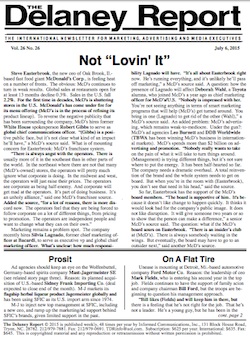 The $6.9 million copyright suit filed Dec. 16, 2015 by The Delaney Report vs. Meredith Corp. touches all the right bases and is the type of suit that ripped-off publishers should have filed against PR Society of America in 1995.
The $6.9 million copyright suit filed Dec. 16, 2015 by The Delaney Report vs. Meredith Corp. touches all the right bases and is the type of suit that ripped-off publishers should have filed against PR Society of America in 1995.
Prentice-Hall, New York Times, Wall Street Journal, Wylie, Probus, Crain’s, Harper/Business, Addison Wesley & Longman and other copied publishers elected not to prosecute the Society although copious evidence was available and they had registered copyrights.
They dumped the matter into the laps of a dozen copied authors who sought legal advice. They were told that costs would be prohibitive since it was a case of individuals battling a corporation that had deep financial resources. In addition, copyright law was so “murky” that success could not be guaranteed, they were told. Lawyers said each author would be counter-sued, resulting in more costs.
The Society’s board, as directed by the 1995 Assembly, appointed a task force of Society leaders to study the issue and report to the 1996 Assembly. But the board met March 15, 1996 and voted the matter closed. It said the task force found no wrongdoing except that the authors should have been consulted before their works were put into the info packs. It offered the authors an “apology.”
New, Non-PRSA Dominated Panel Needed
A new panel—not dominated by Society leaders—needs to examine the copious evidence on this issue that has burdened not only the Society but PR for so many years. Membership of 22,000 is marginally above the 19,600 achieved in 2000. Revenues of $11.1M in 2014 were below revenues of $11.4M in 2006.
Top PR execs, both corporate and agency, now gravitate to the Arthur W. Page Society, Seminar (PR Seminar until 2007), and the PR Council (100+ firms).
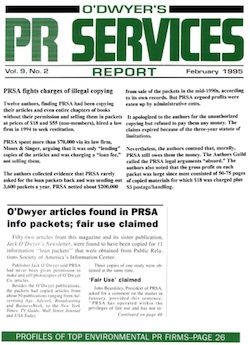 Page, and the “Page Up” organization it recently created, now have 812 members including 190 in Page Up (which allows senior staffers from a Page member company). The total is about double the 420 members that Page had in 2011. There are 632 regular Page members (top communicator in a $2 billion+ company) including 67 from outside the U.S.
Page, and the “Page Up” organization it recently created, now have 812 members including 190 in Page Up (which allows senior staffers from a Page member company). The total is about double the 420 members that Page had in 2011. There are 632 regular Page members (top communicator in a $2 billion+ company) including 67 from outside the U.S.
Seminar is aggressively promoting itself to blue chip corporate execs via an expanded website. The PR Council, whose members include most of the biggest independent and conglomerate-owned PR operations, was formed in 1998 after PRSA rejected firm memberships.
New York Women in Communications is the dominant New York PR/media group with 2,039 members. Its “Matrix Awards” banquet grossed $709,610 in 2014, accounting for most of its revenues of $1,012,925. Dues income was $172,381. Senior memberships were raised from $150 to $200 last year, the first increase in eight years. There are 615 individual professional members and 1,167 "corporate" members who are part of a group.
PRSA “Jury” Had Too Many “Relatives”
What court would allow a jury comprised of relatives of the defendant? Authors had no chance of getting justice from the Society task force of veteran leaders.
Its members, appointed by 1995 president John Beardsley, a vocal opponent of paying anything to the authors, were Cheryl Procter-Rogers, president-elect of the Chicago chapter who became national president in 2006; Lou Capozzi, former Silver Anvil chair, chair of the 1996 “PR for PR” committee of the Society, and currently president of the Society’s Foundation; Jerry Bryan, 1993-94 national board member, and Patricia Trubow, Florence, Ky., counselor, a Society Fellow.
Also members were the top four Society officers plus the immediate past president (the executive committee).
The dispute was not allowed on the agenda of the Nov. 9, 1996 Assembly, disobeying a command of the 1995 Assembly. Nancy Wolfe, Elon College professor and a Society Fellow, asked for it to be discussed at 4:20 p.m. during the “public comment” part of the meeting. Luis Morales, president, noting the room had only been rented until 4 p.m., said a motion to adjourn had also been made and that took precedent. He asked for a voice vote on ending the meeting. The “ayes” and “nays” sounded about equal to this writer but Morales ruled the meeting closed.
O’Dwyer, PR Quarterly Were Most Copied
The O’Dwyer company, having purchased 11 “loan packets” from a list of 1,000-plus available from the Society’s Information Center, found articles copied from about 50 publications including entire chapters of textbooks. Copied were 52 different O’Dwyer articles totaling 109 pages. Second most copied were articles from PR Quarterly, published by Howard Hudson, a Society member. Nineteen PRQ articles totaling 50 pages were found.
Profits were about $60,000 yearly on revenues of $100,000.
The 1992 financial report for the IC showed income of $107,300, costs of $46,000 and net of $61,300.
The individual authors included Profs. Dan Lattimore and E.W. Brody of Memphis State University, authors of PR Writing; Prof. Thomas Bivins, University of Oregon, author of Handbook for PR Writing; Robert Dilenschneider, author of Power and Influence, HarperBusiness; Philip Lesly, Lesly’s Handbook of PR and Communications, Probus; Charles Phillips, Secrets of Successful PR, Prentice-Hall, and Rolf Gompertz, Publicity Advice and How To Handbook.
Publishers Mum
Mum was the word from publishers.
This writer contacted Joe Cappo, senior VP-publishing director of Advertising Age and Crain’s, group publisher in charge of licensing, and presented the evidence we had gathered.
He said neither Ad Age nor Crain’s had given the Society permission to copy its articles and the matter would be turned over to company lawyers. No further word was ever obtained from Cappo or Crain’s on the issue.
Delaney Charges Systematic Copying
Informed Communications, headed by Thomas Delaney, a reporter for the feisty, investigative Gallagher Report until it folded in 1989, charges the publisher of Better Homes & Gardens and Family Circle with “wide-spread, long-term, and systematic theft of the core intellectual property” of Informed Communications,” publisher of the weekly The Delaney Report.
Cited in the 15-page suit on pages 8, 9 and 10 are the Registration of Copyright numbers and dates for 46 issues from February 2013 to September 2015.
IC seeks statutory damages of up to $30,000 for each of the 46 issues ($1,380,000) or up to $150,000 for each issue ($6,900,000) in “enhanced damages” if it can prove infringement was committed willfully.
The suit charges that Meredith executives, officers and/or employees who were not subscribers to the $625 weekly “reproduced it by copying and distributing it internally by various means and/or by printing out copies thereof…permitted numerous executives, officers and/or employees to obtain and review infringing copies of The Delaney Report without obtaining and paying for a subscription, and has permitted and/or encouraged these executives, officers and/or employees to believe that such copying and use was lawful.”
The conduct allegedly occurred from at least early 2011 until just before the filing of the lawsuit. It says the “full scope of Meredith’s illegal and wrongful actions remains to be discovered.”
Meredith Plans Merger
 Meredith (NYSE: MDP), based in Des Moines with a New York office at 805 Third ave. and $1.6 billion in revenues, has agreed to merge with Media General (NYSE: MEG), based in Richmond, Va., with $1.16 billion in revenues.
Meredith (NYSE: MDP), based in Des Moines with a New York office at 805 Third ave. and $1.6 billion in revenues, has agreed to merge with Media General (NYSE: MEG), based in Richmond, Va., with $1.16 billion in revenues.
Media General in September 2015 offered $2.4 billion in cash and stock for Meredith. MG’s 71 local TV stations would be combined with Meredith’s 17 TV stations and its women-focused magazines.
Possibly upsetting the deal is an offer from Nexstar to buy MG for $1.85 billion.
Art Slusark, Meredith spokesperson, would not comment on the IC lawsuit. Four other lawsuits claim that executives, directors and majority shareholders of Meredith would improperly benefit from the deal with MG. Slusark, commenting on one of the suits to the Des Moines Register Oct. 30, described it as “frivolous” and said such suits are common during mergers and acquisitions.

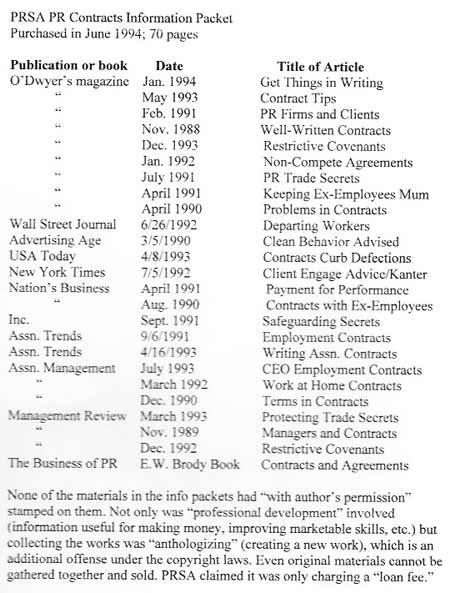
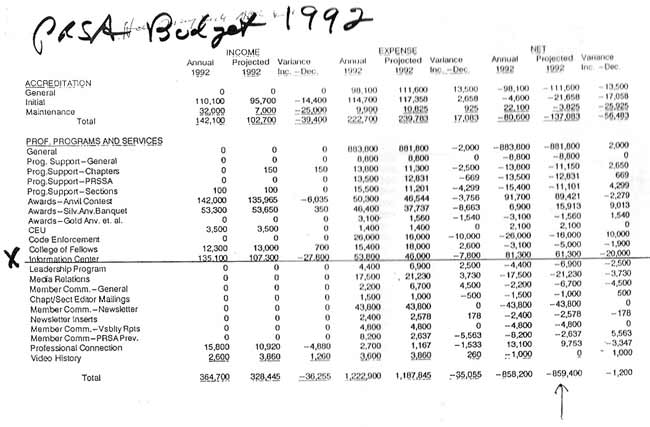

 PRSA-NY today announced its five honorary co-chairs for its Big Apple Awards ceremony gala slated for TAO Downtown on Nov. 15.
PRSA-NY today announced its five honorary co-chairs for its Big Apple Awards ceremony gala slated for TAO Downtown on Nov. 15. PRSA-NY president Carmella Glover today issued a "heartfelt apology" on behalf of the chapter for her Oct. 14 message that "caused disappointment and hurt to some of our valued members."
PRSA-NY president Carmella Glover today issued a "heartfelt apology" on behalf of the chapter for her Oct. 14 message that "caused disappointment and hurt to some of our valued members."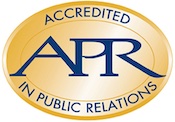 The leadership of Public Relations Society of America is backing a move to change the current “must-have” APR accreditation to “strongly preferred” as a requirement for a seat on its board of directors.
The leadership of Public Relations Society of America is backing a move to change the current “must-have” APR accreditation to “strongly preferred” as a requirement for a seat on its board of directors.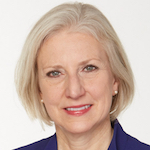 Public Relations Society of American today named Linda Thomas Brooks CEO, succeeding CFO Phil Bonaventura, interim chief since July 2019.
Public Relations Society of American today named Linda Thomas Brooks CEO, succeeding CFO Phil Bonaventura, interim chief since July 2019.


 Have a comment? Send it to
Have a comment? Send it to 
No comments have been submitted for this story yet.